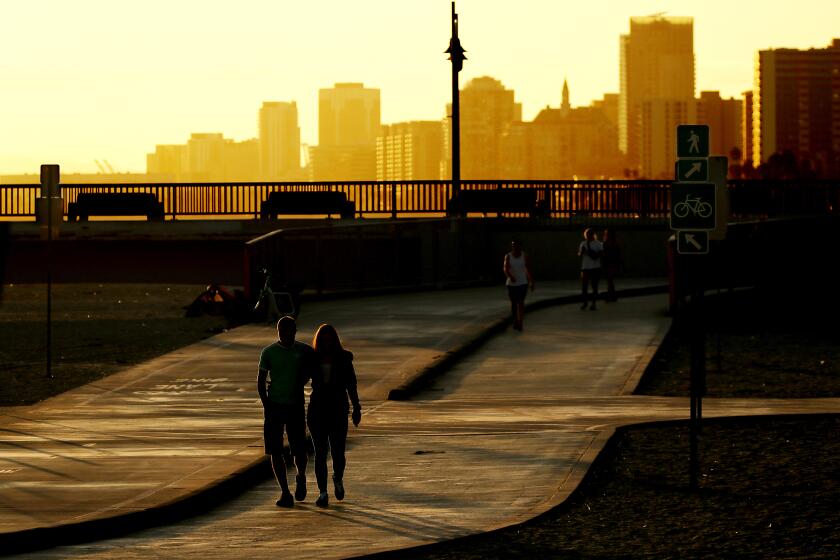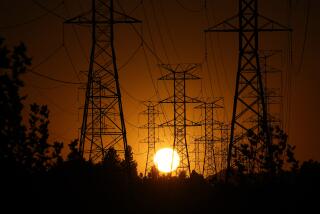California’s heat wave to come ‘roaring back’ this weekend, with more record-breaking temps ahead

Daily temperature records around California continued to shatter this week as an unusual October heat wave broiled the state, with little relief expected the next few days for much of the state’s interior — and even parts of the coast.
Though the current stretch of heat peaked on Wednesday, the high pressure system sweltering much of the southwest will again strengthen this weekend, creating almost two peaks of hot temperatures, according to Kyle Wheeler, a National Weather Service meteorologist in Oxnard. It will cool between 4 and 8 degrees Thursday and Friday across the Southland — while still remaining warmer than average for this time of year — before returning to potentially record-breaking highs again Saturday and Sunday.
“Hot temperatures will come roaring back Saturday,” the Weather Service’s Oxnard office said in a Thursday morning forecast. The Climate Prediction Center warned that much of Central and Southern California would likely experience hazardous heat this weekend, with highs from 90 to 110 degrees threatening temperature records.
The month kicked off with triple-digit temperatures in many parts of the state, with millions of Californians under heat advisories through at least Thursday.
“Into the weekend, we’ll be right back up to those peak levels both Saturday and Sunday,” Wheeler said. The Mohave Desert and Coachella Valley are under excessive heat warnings that have been extended through Sunday and Monday, while much of inland Southern California, including Burbank and the Los Angeles County mountains, are under an excessive heat watch for the weekend.
The spell of warmer temperatures has some Californians referring to this stretch as a “second summer,” especially on social media.
But Crystal Oudit, a meteorologist with the National Weather Service in Monterey, said that’s not really an accurate term, especially when the Bay Area and much of California often sees September and October heat waves.
“Technically this is still a continuation of summer for us,” Oudit said when asked about the idea of a “second summer.”
“It’s pretty normal for us to have breaks [in heat events],” she said.
She noted that the Bay Area typically sees some of its warmest temperatures in September, though this heat wave’s extension into early October — and the extent of the temperatures — makes it slightly more rare.
In the last two days, daily heat records have fallen across the state.
On Wednesday, it reached 111 degrees in Woodland Hills, breaking the previous Oct. 2 record of 109 degrees set in 1991. At Palmdale Airport, it was 105 degrees, eclipsing the old record of 101 degrees set in 2020. Inland, temperatures reached 110 degrees at Lake Elsinore, breaking its record of 106 degrees set in 2012.
In Central California, Fresno Yosemite International Airport set a daily record Wednesday when it reached 102 degrees, breaking its previous record of 101 set in 1980. As did Merced, which hit 103 degrees, surpassing the high from 1905 of 101.
In Northern California, several daily heat records were broken Wednesday, including at Stockton airport where it reached 105, breaking its old record of 101 set in 1952. And in Modesto, it reached 104, breaking the previous record of 99 degrees set in 2012.
Several areas also broke records for minimum temperatures, with mercury never dropping below 81 degrees in Indio on Wednesday, beating out a 1906 record of 71 minimum low temperature.
On Wednesday, Glamis, in eastern Imperial County, was the nation’s hottest location, hitting 114 degrees. On Tuesday, Palm Springs and Indio tied for that spot, at 117 degrees, according to the National Weather Service.
That spike to 117 degrees tied the record for the hottest October day anywhere in the contiguous U.S., according to Tony Fracasso, a forecaster with the weather service’s Weather Prediction Center, though he noted that determination is still preliminary. On Oct. 2, 1980, Mecca in Riverside County hit 117, setting the record for warmest day in October.
“We are talking about temperatures that aren’t just hot because it’s the desert, it’s hot because of the weather pattern,” said Alex Tardy, a National Weather Service meteorologist in San Diego. “This heat is not just Southern California — it’s Northern California, it’s Nevada, it’s Arizona. It has a large grip on the southwest.”
Temperatures will be up to 15 degrees above normal this week, peaking Wednesday and Thursday, with a heat advisory for the Bay Area before a cool trend Friday.
Phoenix has seen a streak of record-breaking hot weather, on Wednesday topping a daily temperature high at 108 degrees, following an all-time October high from the day before, at 113 degrees, according to the National Weather Service. Las Vegas has repeatedly set records, adding to its tally of days at or above 100 degrees in a year, now at 107, already a week beyond the previous record from 1947.
While San Francisco didn’t set any records, it hit a high of 95 degrees Wednesday, something particularly rare for the typically mild, coastal city, especially in October. Temperatures in San Francisco have hit above 90 degrees in October in only 31 of the last 150 years, according to Rachel Kennedy, a National Weather Service meteorologist in Monterey.
“This has definitely been our hottest couple of days on the coast this year,” Kennedy said, though she noted that the Bay Area often sees some of its warmest weather in the late summer and early fall.
Campo and Palm Springs also both set record highs for their respective cities for any October on Tuesday, with Campo hitting 105 degrees, and Palm Springs at 117 degrees.
The dry, summer-like temperatures have also stymied firefighters efforts in Southern California to halt three wildfires that broke out weeks earlier.
Among the most challenging has been the Line fire in the San Bernardino National Forest, where containment peaked at 83% on Sunday before the fire raced out of control and sparked more evacuations as containment dropped. Crews have been working to regain control of the fire, and containment has inched back up to 79% as of Thursday morning. The fire has scorched 43,922 acres.
The other major blazes in the area — the Bridge and the Airport fires — were 98% and 96% contained as of Thursday morning, respectively, according to the California Department of Forestry and Fire Protection.
More to Read
Sign up for Essential California
The most important California stories and recommendations in your inbox every morning.
You may occasionally receive promotional content from the Los Angeles Times.













